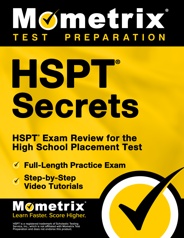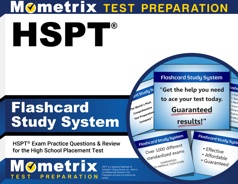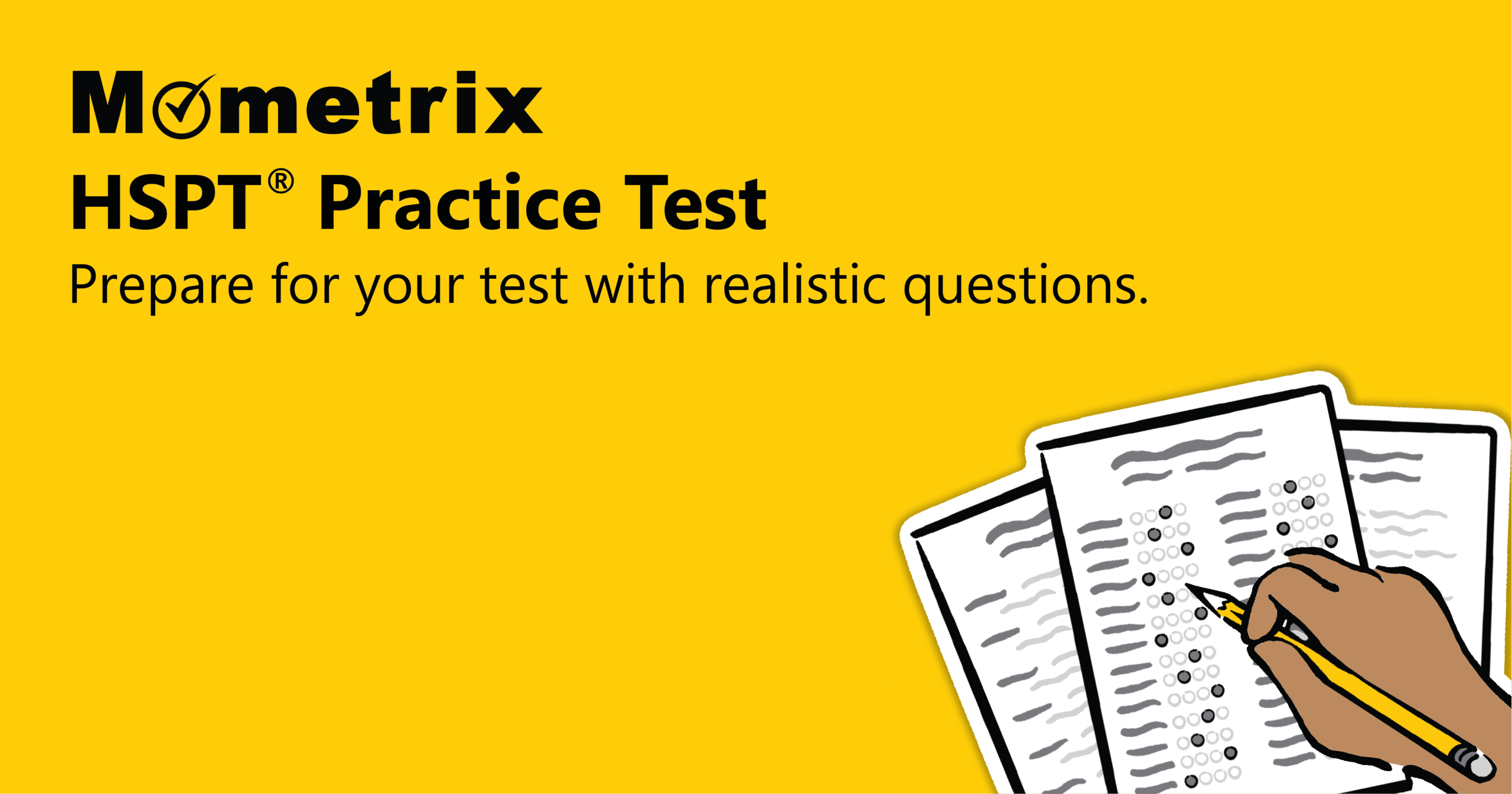Many private high schools require applicants to take the High School Placement Test (HSPT®). This placement test is administered to eight grade students to ensure that they are registered for the high school course curriculum best suited to their current knowledge and skill sets.
Click “Start Test” above to take a free High School Placement practice test!
HSPT Practice Tests by Subject
If you need some extra practice in a specific subject, click one of the subjects below to get started on a subject-specific HSPT practice test.
HSPT Outline
The High School Placement Test, which is administered twice a year, contains 298 multiple-choice questions. The time limit to complete the test is 2.5 hours.
The test is split into five sections:
Verbal Skills (60 questions)
The questions in this section test your ability to perform reasoning tasks that involve the use of words. Here’s a look at the specific topics that will be covered:
- Analogy
- Logic
- Verbal classification
- Synonyms
- Antonyms
Reading (62 questions)
The questions in this section test your ability to comprehend various aspects of a text. Here’s a look at the specific topics that will be covered:
- Informational text
- Craft and structure
- Integration of ideas
- Literary text
- Literary techniques
- Vocabulary
Mathematics (64 questions)
The questions in this section test your ability to perform arithmetic calculations and apply math concepts to solve problems. Here’s a look at the specific topics that will be covered:
- Numbers and numeration
- Measurements
- Geometry
- Algebra
- Statistics and probabilities
Quantitative Skills (52 questions)
The questions in this section test your ability to do reasoning problems that involve various quantities. Here’s a look at the specific topics that will be covered:
- Sequence
- Reasoning
- Geometric comparison
- Non-Geometric comparison
Language (60 questions)
The questions in this section test your general language knowledge and skills. Here’s a look at the specific topics that will be covered:
- Punctuation
- Capitalization
- Incorrect usage of parts of speech
- Correct usages of parts of speech
- Spelling
- Composition
Check out Mometrix's HSPT Study Guide
Get practice questions, video tutorials, and detailed study lessons
Get Your Study Guide
Registration
Each school has specific criteria you need to meet before you take the test, so you should contact the school you would like to test at and ask them how to register.
The testing days are established by each school, so there are no nationally-set dates set aside for testing. Usually, the HSPT is given in the spring and fall of each year.
Fees
The average test cost is between $20 and $25, depending on the school administering the test.
How the Test is Scored
The scale the test is scored on provides a possibility of 200 to 800 points for the test. Each school sets the score they require a student to receive.
Composite Scores
The composite score will tell high schools about your total performance on the five subtests of the HSPT battery. Because it is a total score, you must complete all subtests in order for this to be reported. It consists of three parts:
- Total Cognitive Skills – Verbal and Quantitative subtests
- Total Basic Skills – Reading, Math and Language subtests
- Composite – Verbal, Quantitative, Reading, Math and Language subtests
Normative Scores
Normative scores are made up of five different types of scores. Your school will decide if and how to use each one:
- National Percentile (NP) Rank: This score compares your individual performance with other students at the same grade on a national level. Scale ranges from 1 to 99.
- Local Percentile (LP) Rank: This score is similar to the national percentile rank, except it compares your performance to other local students at the same grade.
- Grade Equivalent (GE): This score compares your performance with the average performance of students at other grade levels. This score is tricky and can be deceiving. For example, if you score a GE of 9 as an 8th grader, it does not mean you should skip a grade and be placed in 9th grade.
- Cognitive Skills Quotient (CSQ): This score serves to predict your future academic performance, replacing the traditional IQ score. It can be interpreted using the same IQ score guide. For example, above 130 being the upper echelon and below 70 being the lower echelon.
- Standard Score (SS): This score ranges from 200 to 800. It is a frame of reference which allows for accurate group comparisons from one year to another.
How Your Scores are Used
Your high school placement test is used to help you be assigned to the proper classes and grades when you are admitted to a new school and during scholarship selections.
Each school is different in how they evaluate and use the scores from the HSPT. There is no unilaterally assigned use or importance given to the test scores.
To have testing scores sent to another school, you first need to contact the school that administered the test. The school can then forward the results to the other school or permit STS to send the report to the other institution. STS cannot deliver scores or reveal a student’s score without the permission of the school that first administered the test.
Check out Mometrix's HSPT Flashcards
Get complex subjects broken down into easily understandable concepts
Get Your Flashcards
Study Tips
How to Study Effectively
Your success on HSPT test day depends not only on how many hours you put into preparing but also on whether you prepared the right way. It’s good to check along the way to see whether your studying is paying off. One of the most effective ways to do this is by taking HSPT practice tests to evaluate your progress. Practice tests are useful because they show exactly where you need to improve. Every time you take a free HSPT exam practice test, pay special attention to these three groups of questions:
- The questions you got wrong
- The ones you had to guess on, even if you guessed right
- The ones you found difficult or slow to work through
This will show you exactly what your weak areas are and where you need to devote more study time. Ask yourself why each of these questions gave you trouble. Was it because you didn’t understand the material? Was it because you didn’t remember the vocabulary? Do you need more repetitions on this type of question to build speed and confidence? Dig into those questions and figure out how you can strengthen your weak areas as you go back to review the material.
Answer Explanations
Additionally, many HSPT practice tests have a section explaining the answer choices. It can be tempting to read the explanation and think that you now have a good understanding of the concept. However, an explanation likely only covers part of the question’s broader context. Even if the explanation makes sense, go back and investigate every concept related to the question until you’re positive you have a thorough understanding.
Comprehend Each Topic
As you go along, keep in mind that the HSPT practice test is just that: practice. Memorizing these questions and answers will not be very helpful on the actual test because it is unlikely to have any of the same exact questions. If you only know the right answers to the sample questions, you won’t be prepared for the real thing. Study the concepts until you understand them fully, and then you’ll be able to answer any question that shows up on the test.
Strategy for HSPT Practice
When you’re ready to start taking practice tests, follow this strategy:
- Remove Limitations. Take the first test with no time constraints and with your notes and HSPT study guide handy. Take your time and focus on applying the strategies you’ve learned.
- Time Yourself. Take the second practice test “open book” as well, but set a timer and practice pacing yourself to finish in time.
- Simulate Test Day. Take any other practice tests as if it were test day. Set a timer and put away your study materials. Sit at a table or desk in a quiet room, imagine yourself at the testing center, and answer questions as quickly and accurately as possible.
- Keep Practicing. Keep taking practice tests on a regular basis until you run out of practice tests or it’s time for the actual test. Your mind will be ready for the schedule and stress of test day, and you’ll be able to focus on recalling the material you’ve learned.

HSPT Online Prep Course
If you want to be fully prepared, Mometrix offers an online HSPT prep course designed to give you everything you need to succeed!
Here’s what you’ll find in the HSPT course:
Everyone learns differently, so we’ve tailored the HSPT online prep course to ensure every learner has what they need to prepare for the HSPT exam.
Click below to check it out!
FAQs
Q
What does the HSPT stand for?
A
HSPT stands for High School Placement Test.
Q
Can you take the HSPT test more than once?
A
Unfortunately, you can only effectively take the HSPT test once. If you choose to take the test more than once, your lower score will be used.
Q
Are you allowed to use a calculator on the HSPT?
A
No, calculators are not allowed to be used on this test.
Q
Is the HSPT test all multiple-choice?
A
Yes, every question on the HSPT is multiple-choice.
Q
What is a passing score for the HSPT?
A
The HSPT exam is scored on a scale, with 200 being the lowest possible score and 800 being the highest score. However, each school has a different set score as what constitutes as “passing.”
Q
How many questions are on the HSPT?
A
There are 298 questions on the test.
Q
How long is the HSPT?
A
The time limit for the test is 2.5 hours.
Q
What happens if I miscode my school on my HSPT answer sheet?
A
If you accidentally write the school code incorrectly on your answer sheet, your parent or guardian will need to contact the school where you tested after there has been a sufficient amount of time for scores to come in. The parent must request the school to forward the score report to the correct school.
Q
How do I get a copy of my scores?
A
The school that administered the test controls the score results and the distribution of those scores, so you will need to contact the school to find out more specific information.
HSPT is a registered trademark of Scholastic Testing Service, Inc., which is not affiliated with Mometrix Test Preparation and does not endorse this page.




